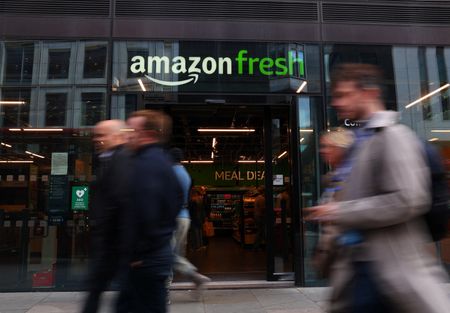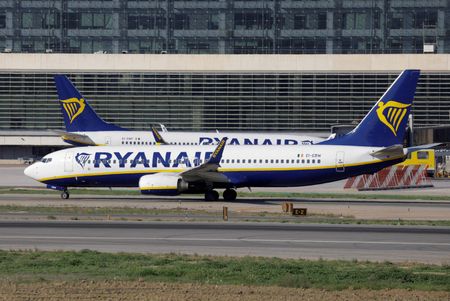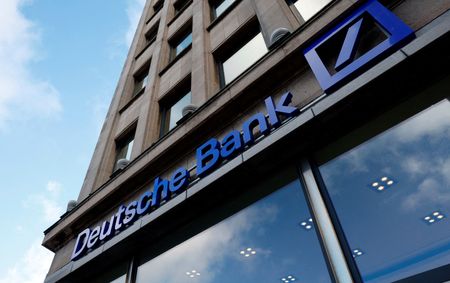By James Davey
LONDON (Reuters) -When Amazon opened its first grocery store outside the United States in 2021, its choice of a site in west London for a cashier-free store was seen as the start of a major assault on Britain’s $290 billion food market.
That store closed in 2023 and this week the group said it planned to shut its remaining 19 Amazon Fresh stores – a failure that highlights the brutal economics of UK food retail, and how one of the most powerful retailers in the world may still be feeling its way on how to compete globally in groceries.
Amazon, which also runs Amazon Fresh stores in the United States as well as the upmarket Whole Foods Market chain, never confirmed UK store targets, but 2021 media reports suggested plans for over 260 Fresh outlets by end-2024.
Last year, it also dropped Amazon Fresh delivery in five cities but still serves over 100 UK towns and cities, including London, Birmingham and Manchester. It also ended its own grocery delivery service in Germany.
Amazon’s announcement does not impact its more than 60 Amazon Fresh stores and more than a dozen Amazon Go stores in the United States or its over 539 Whole Foods Markets locations across the U.S. and Canada, the company said.
PLANS TO EXPAND ONLINE DELIVERY
Amazon insists grocery remains a key part of its UK ambitions — its third biggest market overall after the U.S. and Germany.
It said on Tuesday it plans to expand UK online delivery of everyday essentials and fresh groceries through its main Amazon.co.uk site, the Amazon Fresh site, and partnerships with supermarkets Morrisons, the Co-op, Iceland, and rapid delivery firm Gopuff, where orders are placed via Amazon’s site but delivered by the retailers.
Amazon plans next year to introduce perishable groceries on Amazon.co.uk with same-day delivery, a service it recently launched in the United States. It will also convert five Amazon Fresh locations to the Whole Foods Market format, giving it 12 stores by the end of 2026.
But after over 15 years selling groceries, analysts estimate Amazon’s UK market share remains below 1%, despite its stock market value being over 60 times that of industry leader Tesco.
Amazon does not publish financial results for UK grocery.
According to Reuters interviews with former employees, rival executives, consultants, analysts and academics, Amazon misjudged the challenge of adapting its global retail model to the nuances of UK food retailing, where 14 household names fight for margins under 5%.
One former UK grocery retail CEO, who declined to be named, said building a mass food retail operation in Britain required a very different skill set from Amazon’s general merchandise expertise, such as specialist logistics and systems.
“It’s a volume game, building scale is expensive, and the market is intensely competitive,” he said.
German discounters Aldi and Lidl took decades to turn sizeable profits in Britain, while online supermarket Ocado is barely profitable 25 years after its founding. And U.S. retail giant Walmart bought Asda in 1999, but sold it in 2020 having failed to realise its UK ambitions.
The market is dominated by Tesco, with a market share of 28.4%, according to Worldpanel data, ahead of Sainsbury’s on 15.1%. Aldi and Lidl have built a combined 18.9%.
Amazon may have also misjudged British shoppers.
It launched stores during a cost of living crisis, pushing checkout-free technology as a differentiator when consumers were focused on saving money.
STRAINED RELATIONSHIPS WITH SUPPLIERS
Amazon’s relationship with suppliers is another area where it has struggled. Consultants who have worked with Amazon suppliers say that, unlike other retailers, it doesn’t make full checks when goods arrive, instead relying on automated product recognition.
David Sables, CEO of Sentinel Management Consultants, which advises suppliers in their dealings with supermarkets, said that has led to a disproportionately high number of supplier disagreements with Amazon over the quantity of goods received, leading to delayed or incomplete payments.
Amazon is being investigated by the industry regulator over alleged supplier payment delays, and has been ranked Britain’s worst-performing grocer for compliance with a code of practice since 2022.
Amazon said it takes the industry code seriously and plans to demonstrate its ongoing compliance.
GROWTH OPPORTUNITIES IN ONLINE DELIVERY
Amazon said on Tuesday it was closing Amazon Fresh stores in Britain because of “the very substantial growth opportunities in online delivery”.
Martin Heubel, a former senior food category manager at Amazon, said the company’s online tie-ups with supermarkets were more profitable, earning commission without bearing the costs of fulfilment.
Amazon cited a report from PwC’s Strategy& that by 2030, Britons would conduct over 25% of their food spending online.
But that looks optimistic.
Online’s share of Britain’s total grocery market peaked at about 15% during the COVID pandemic and was 13.4% in September, according to market researcher NielsenIQ.
“As 2025 comes to a close to reach 25% by 2030 would require something currently unforeseeable to happen,” said Clive Black, head of consumer research at investment group Shore Capital.
A decade ago, Amazon’s push into UK grocery was the hot topic among industry executives.
“Now in terms of grocery, Amazon is very rarely mentioned as a serious competitor,” said Black.
(Reporting by James Davey.Editing by Mark Potter)











